- Home
- Greg James
Under A Colder Sun (Khale the Wanderer Book 1) Page 14
Under A Colder Sun (Khale the Wanderer Book 1) Read online
Page 14
“It’s here. The Timestone is here!”
*
They came to the heart of the labyrinth where it was waiting for them.
No, Khale thought, waiting for me.
The Timestone, pounding with the rhythm of a heart, gave off a hideous light bathing the circular chamber in luminous shades and colours that Khale could not name. The Timestone itself was a cuboid etched with eldritch lines and ornate markings resembling spirals and flickering flames. To look upon them for too long was to start to entertain the notion that they were moving of their own volition. Khale greeted the sick, twisting feeling the sight of them gave him. It meant that he had found what he was looking for.
M’taoi was on her knees again, beating her forehead against the ground. He was tempted to put his foot on her neck and grind the air from her lungs. He had no intention of letting her walk away from this alive.
But that pleasure could wait, he sheathed his sword and walked forward.
“No. You must not touch the Timestone, my lord. It will eat your soul.”
Khale looked back at her and felt something that was not good but pleasing inside, as she recoiled from the way the Timestone’s light illuminated, rather than darkening, his features and showed his immense age. Every line, every mark, every scar that he had borne since he left mortality behind. And his eyes were beginning to shine with the same light as the Timestone. He could feel it.
“I have no soul for it to feed upon, child.”
The trails of ancient tears were revealed on the Wanderer’s face as were the etched depths and hollows left behind by screams, his own and those of others he had known. The emptiness that echoed on and on inside him, behind his cursed eyes. No man or creature alive was nearer to the nature of Death itself than he was. Even Gods fell under his sword.
“God ...” M’taoi said, “My God ...”
She was crying, and then she was dying.
The light of the Timestone took her and Khale to pieces.
*
Khale opened his eyes and he was back where it had all begun for him.
A great battle, long ago, between the Celts and the Romans. Men clad in animal furs and woad against the armoured might of an empire. He breathed in the scent of blood and battle percolating through the air. On this ground, from dawn until dusk, men of the highlands and those from a far-off country had fought one another in a growing ordure of churned mud and entrails. The rain came and did not wash the ground clean of the slaughter. Many fell, more than could ever be counted, and such was the scale of it that Death herself walked corporeal among the fallen, harvesting their screaming souls. Her great ragged wings beating in time with the clash of sword and the drumming of blows upon armour and shields. Through the night, she slid her freezing fingers into the chests of the dying and plucked out their hearts before favouring their blue lips with a final, fleshless kiss.
It was the dawn of the following day when Khale materialised. The light of the Timestone ebbed away around him and he trod a path through the moaning and the dead. Death had already come upon him. The man he had been back then. He could see himself now. The last man left standing, alone, wearied, bloodied but still fighting on against Death itself. He had been a mere mortal but still a darkness clung to him more than any other man of his clan. It coloured his blood with a bitter lust for the kill that none of his fellows shared. He could see his friends and family among the dead, carved into pieces, torn apart, the hollows where their eyes had once nestled no longer judging him as they had before. The elder Khale advanced with what speed he could through the morass of corpses. Death had raised her blade high to lay him low and he saw his sword raised in kind, meeting hers with a thunderous crack that shook the air and the ground.
The Man That Turned Death's Blade Aside.
A name that would reverberate through the coming millennia.
A monster was being made. A nightmare was about to be born.
Death was tireless. She swung her blade down to cleave his skull. Again, she was parried. Again, she was denied blood. No words were spoken. No sound was uttered by either one. There was only the relentless song of clashing steel ringing out across the reeking battlefield as the elder Khale came closer. On and on the duel went as he parried each thrust and feinted away from every slash she made. The memories were bright and hot in his mind. He could feel his heart aching as he remembered this day.
The struggle would soon be decided.
The elder Khale unsheathed his sword. It shone alien in the grey light of the highlands. Burnished and glinting in a way not dissimilar to the shade of his tainted eyes. It was Carcosan yellow steel, a good, strong blade and one of the last of its kind. Khale watched as Death misjudged the weary mortal he had been. The arrogance born in the hearts of all Gods and Goddesses making her gestures grander, her blade falling only after ostentatious, taunting sweeps and displays of her unholy dexterity were made. She thought his slowness to be more than the feint it was. Despite himself, Khale smiled as there was the smallest pause between one blow and the next.
There!
The mortal man struck.
A dagger secreted in one of his boots was driven into the place where Death’s heart should have been. She had no heart to speak of so the wound was no more fatal to her than the bite of an ant, but it was the distraction that he had needed. Faltering, her black eyes wide at the sign of harm inflicted upon her by a mortal, Death did not see, or believe, that she was about to fall to his sword. He shattered her smoking blade and then his sword came around again to decapitate her.
The elder Khale’s blade struck the killing blow aside.
His eyes met those of the man he had once been.
“What are ye?”
His eyes had been so clear and untainted then, without sickness or disease.
“I am what you will become.”
“What I’ll become?”
“Slay her and you are doomed.”
The mortal man’s face twisted in a snarl he could feel shaping his own features. Their swords struck, clashed and then ground against one another.
“She’s my kill. I will have her.”
“You will not. If you do, there’s nothing but darkness and despair to come. You will be a hollow man. An emptiness adrift. You. Must. Not. Slay. Her.”
Khale fought Khale and as they did, the world shifted around them. Waves of sickness and pain struck each man. Time was being torn. Far away, the elder Khale fancied he heard a profound wordless scream. The mortal Khale was weeping tears of blood. The elder Khale drove home a series of heavy two-handed blows, driving the mortal Khale to his knees. He set his sword against the throat of the other man and shivered as he felt a line of ice cold drawn across his own neck.
“I do this for you. For the life you can have if you turn and walk away from this battlefield. It will be short and mortal and the life you should have had. The one I should have had.”
The eyes of the other were not sick and yellow like his own, the defiance in them raged fierce and clear.
“I will have my kill, whoe’er you are. Or, you will have yours and take my head home.”
“You must not slay her.”
“ ... but I may slay him.”
The elder Khale’s heart missed a beat as he realised who had spoken, what had happened and what he had done. He looked down at the face of the mortal Khale and saw that all colour was draining from it. The eyes were dilating. The mouth was slack. The elder Khale dropped his sword and stepped away, letting his own corpse fall to the ground. It lay there. Still. Unmoving. A great wound in its chest and blood blossoming out from it.
Khale turned and faced Death.
She held his heart in one hand and his own dagger in the other. She smiled at him, the same cold smile that he had in some way inherited.
“So, is that it now? Am I to die, at last?”
He closed his eyes and waited. His mortal self was slain. Time would catch up with him now. All the centuries upon centuries of
darkness would never have been. He was to be freed from the weight and yoke of endless living at last.
But nothing came.
Nothing changed.
Death laughed at him with the shrillness of a feasting vulture.
“You are not to die here, Khale. I said forever, remember?”
He opened his eyes, “What?”
"I told you that what you did on this day, raising your hand to a Goddess such as me, for turning my blade aside, would be forever. I set you upon the roads of the world, to walk them all until Time’s end."
“But Time is changed now. I died here. I will rot here. I will never be immortal.”
“You died here by your own hand, dear Khale.”
A tremor passed through him.
“You have learned much since you were a caveman of these hill-folk,” she said disdainfully, prodding one of the Celtic bodies with her foot. “You should know that what you have created here, by coming back, is a paradox. You fought with yourself. You died but you are here before me, still alive.”
Khale’s fingers made fists and he ground his teeth against the tears he could feel burning in his eyes.
“You forget that you are not a God to rewrite Time as you wish it to be. You are mine, Khale, and I wish you to walk all the roads that you have already walked again. Every day, every year, every century that you have already suffered through, you will suffer through again. Remember, you are the puppet and I am your mistress.”
Khale screamed. It was a wet, raw sound torn from somewhere deep inside and with it he set upon her. He remembered the first time when he had been a mortal man, how he took her head clean off in one stroke. This time, he butchered her. He hacked and hacked away at Death until she was nothing more than pulp, torn cloth and splintered bones, and she did not stop laughing for all that time. He trampled her remains into the bloodied mud of the battlefield as a sudden and terrible cold surged through his heart and up into his throat, choking him as surely as a freezing hand might. He fell to his knees to weep and to wail, long and hard, as the corpse of Death slowly dissipated and blew away like ashes on a wind that was not there.
Khale was left alone on that battlefield and alone in the world, once again.
For none are like him, nor shall they ever be.
For he is the Wanderer and he is Eternal.
END
Each Dawn, I Die
The Wanderer came out of the wastes. A bullock of a man clad in matted furs of white, brown and grey. Bitter winds blustered about his feet and whipped his dark trailing hair and lengthy beard until they were lashing like aged medusa coils. Despite the bite and sting of sand and ash, his eyes remained open, permafrost jewels staring ahead through the gusts of the growing storm. Out here, beyond the northern mountains and over the grassland plains, there was little in the way of shelter. That was why few came here and that was why the Wanderer was alone.
There was a shadow out there, breaking the line of the horizon. Angular enough for him recognise it as a creation of men rather than of nature. Whatever it might be, he would have to hide within it until this storm passed on. The tales of the winds that chased one another across the Western Wastes told of bodies discovered where the flesh and muscles had been torn clean away from the bone. Though whether that was down to mere winds or something else with flesh, muscles and bones of its own, the Wanderer did not know. Still he did not mean to wait around here and find out the truth. Where there was shelter to be had, it should be taken. He strode towards the waiting shadow without further pause.
*
It was a necropolis of some kind, hewn from stones long-buried. It seemed ancient, the upright stones were crudely cut with sigils and signs that were little more than the scars a man might make by mindlessly battering at rocks with a piece of flint. And it was that sense that the stones were less engraved, more marked and scarred, that made his old stomach turn. His own scars, hidden underneath his furs, began to itch. He took in the many stones that were leaning precariously or altogether fallen, broken and wearing away into the dust. He walked among them and felt a chill that seemed to ebb into him from out of the ground itself.
I should not stop here, he thought, and turned about.
And there before him was a way into the burrows and catacombs beneath where the men who had raised these stones were doubtless interred. A slab of stone barred the way. It was laid across the opening between two uprights with a third set above as a mantel. The winds were becoming very fierce, biting through his furs and into his skin. He would have to be quick.
The Wanderer went up to the stone slab, flexed his fingers, put his full weight behind it and then he pushed hard. At first, nothing. He let out a roar, spat on the obstructing stone and pushed hard once more. This time, there was a deep grinding of stone. Then, there was a cracking, a sound of sundering and the stone slab crashed down the unlit steps into the depths below.
The Wanderer followed the echoes it left behind.
*
It was a long way down, or so it seemed in such utter darkness. Mulch and lichen crunched and crumbled underneath his footsteps as he descended. His keen eyes made out rusted sconces mounted on the walls to either side, set there to light the way for bearers of the dead. All were unlit and made into nests by spiders.
As he went further and deeper, he slowed his steps, creeping on as quiet as he could. The light cast from the entrance way was little more than a pinprick, no bigger or brighter than a lone star in the heavens on a clear night. And even though his eyes were sharp, in this all-consuming penumbra, he was as near to blind as he had ever been in his life. With a swift hand, he reassured himself that his blade was still secured beneath his furs. If there was something other than himself and the sleeping dead abroad in this necropolis, he would strike it down.
It was then that he saw the light. A pale phosphorescence coming from not far below.
From where these steps must come to an end, he thought.
Keeping his breath steady, knowing he had no other way he could go, except to retreat into the howling embrace of a sandstorm, he came down to the last step and set his feet on unbroken ground. He looked around. The phosphorescence illuminated his surroundings brilliantly. Three roughly-cut tunnels ran away from him until they became dark and unlit once more. Reaching out to touch the shining stone of the walls, he saw the light was cast by a fungus grown thick in the cracks, scars and divots that were there. He could make out deeper hollows cut into the tunnel walls and the embalmed bones that they held. Here, a shattered helm. There, a rust-and-rot-pocked sword. The dead were sleeping, nothing here was stirring.
So he thought until he heard a wail that was not made by the winds of a sandstorm.
Swallowing hard, the Wanderer drew his blade out from amongst his furs and, with his free hand, he scraped handfuls of the shimmering mould from the walls and smeared them onto the metal so as to light his way. The sound had come from somewhere up ahead, deep within the unlit, farther darkness. Holding his sword angled, ready to strike, the Wanderer followed the sound into shadow.
*
Whereabouts he now stood under the shifting sands of the wastes above, the Wanderer did not know. But he did know that the chill he felt when he walked among the standing stones was now emanating from all around him, not just rising from the ground under his feet. He walked slow, his muscles tense, his heart fast and his breathing shallow. He could taste fear in the air as something sickly lying on his tongue. The toe of his boot struck something soft and meaty in the dark. It let out a cry, it was in the same tone as the wail he had followed.
The Wanderer stepped back and raised his sword, showing light to what lay at his booted feet. And he saw a man, what was left of him; a husk of blackening, corrupted meat that was slowly sloughing off its own withered bones. The man was dressed in the remains of scaled armour and his eyes were white globules sunk deep into his face. A tongue worked feverishly behind toothless, rotten gums, aching to speak.
The Wander
er, wary, leaned in to listen.
And the dying man told him his tale.
*
There were many more such men scattered along the length of the tunnel ahead. Soldiers, nobles, barons and even kings were there, reduced to rotten shades of what they once were. Lowing, moaning and howling, grasping at him with their fetid fingers, begging to tell their woes to the unsoiled Wanderer. He cast them off and turned them aside. The tale of the first of the dying was enough for him. Now he knew what waited for him in the dark down here.
A serpent's smile crept across his ragged lips.
The hall was as he had expected when he came to it. Ruined and empty with a single long table of stone slabs dividing its centre. A crude facsimile of the Eating Hall of the Dead from old legends. Dust, cobwebs and the droppings of cemetery vermin were everywhere. He waited patiently at the nearest end of the table until the light came. It was a warm light, soft and soporific, seeping in from no place he could see. And before his eyes, the filth of the hall evaporated as if it had never been. Every inch of stone suddenly appeared polished and as smooth as once it had once been. And the table was laden with platters of spiced meat, poached fish, sweet fruits and numerous flagons of mead, ale and rice wine. The smell arising from the feast was luxurious and it made his mouth water. He reached out, plucked a ripe, red grape and popped it into his mouth. He bit through the thin skin into the cool, wet, sugary flesh beneath and smiled as he swallowed the morsel.
Delicious indeed.
*
It was some time later that she came into the hall. The Wanderer saluted her with a flagon, slopping mead down his arm and onto the floor. His belly was full to bursting. His mouth was stained and smeared from his hearty feasting; bones from chicken, pig and ox were scattered all around. He made to speak but instead emitted a drunken belch.

 Kid Normal and the Final Five
Kid Normal and the Final Five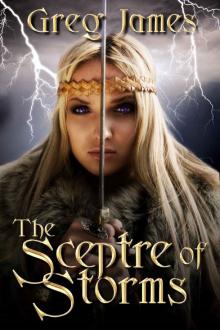 The Sceptre of Storms
The Sceptre of Storms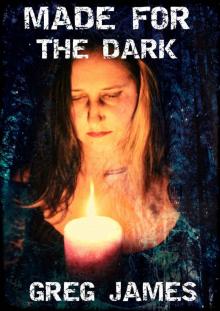 Made for the Dark
Made for the Dark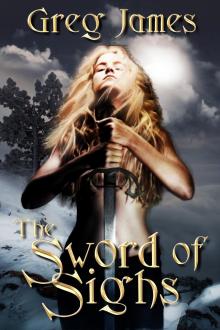 The Sword of Sighs
The Sword of Sighs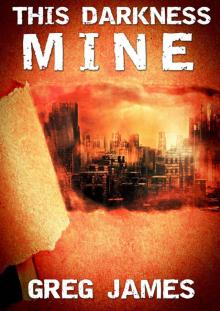 This Darkness Mine
This Darkness Mine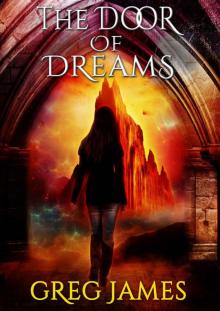 The Door of Dreams
The Door of Dreams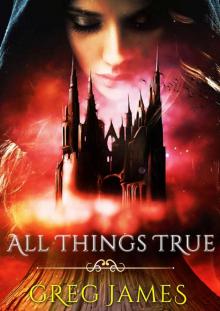 All Things True
All Things True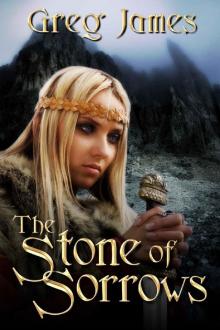 The Stone of Sorrows
The Stone of Sorrows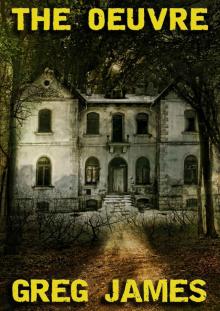 The Oeuvre
The Oeuvre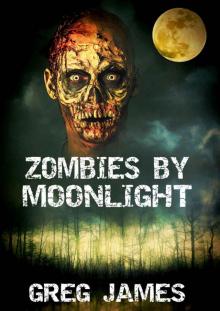 Zombies by Moonlight
Zombies by Moonlight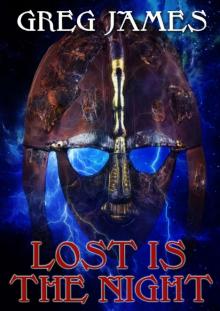 Lost Is The Night
Lost Is The Night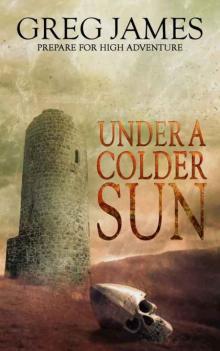 Under A Colder Sun (Khale the Wanderer Book 1)
Under A Colder Sun (Khale the Wanderer Book 1)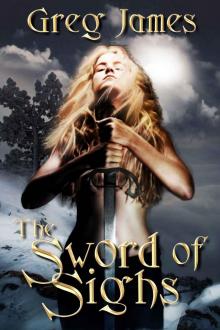 The Sword of Sighs (The Age of the Flame: Book One)
The Sword of Sighs (The Age of the Flame: Book One)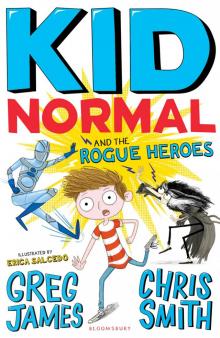 Kid Normal and the Rogue Heroes
Kid Normal and the Rogue Heroes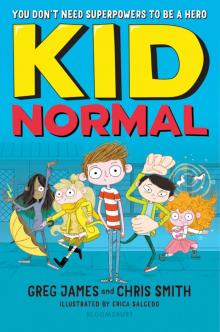 Kid Normal
Kid Normal